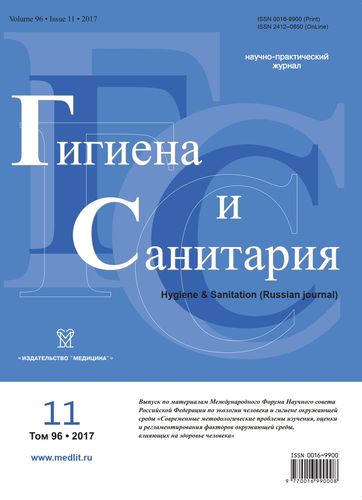Hygienic assessment of nutrition status of the population of the gerontological group
- Authors: Doszhanova G.N.1, Abduldayeva A.A.1
-
Affiliations:
- Astana Medical University
- Issue: Vol 96, No 11 (2017)
- Pages: 1084-1087
- Section: FOOD HYGIENE
- Published: 21.10.2020
- URL: https://ruspoj.com/0016-9900/article/view/640735
- DOI: https://doi.org/10.47470/0016-9900-2017-96-11-1084-1087
- ID: 640735
Cite item
Full Text
Abstract
Among many environmental factors nutrition is paramount, permanently and exclusively affecting in multidisciplinary mode on the biological and social essence of the human body. Therefore, this article describes the results of the actual supply of people aged of 60-89 years taking into account their eating habits associated with age-related changes in the gastrointestinal tract and metabolism. The study involved 611 respondents aged of 60-89 years, including men (23.9%) and women — 76.1%, living in Astana, the average age accounts of 73 ± 0.41 years. The actual food was studied by frequency and a 24-hour simulation, recommended by the WHO for epidemiological studies. In assessing the adequacy of the supply of the reference values there were taken norms of physiological requirements in energy and nutrients for the population of gerontological groups of the Republic of Kazakhstan, as well as the norms of consumption of micronutrients on a scale of FAO / WHO. The study of the actual nutrition of the category of persons of Astana showed the diet of elderly people to be consisted of foods containing mostly protein and animal fats and digestible carbohydrates, while two latters were characterized by an excess of saturated fatty acids, the lack of polyunsaturated fatty acids, a high level of simple consumption carbohydrates from refined foods such as sugar, refined cereals, flour and poly- micronutrient failure of the nutrition on vitamins (deficiency of vitamin D, A, B1, E, C, biotin, folic and pantothenic acid) and minerals (calcium deficiency, potassium).
Keywords
About the authors
Gulnur N. Doszhanova
Astana Medical University
Author for correspondence.
Email: doszhanova_gulnura@mail.ru
ORCID iD: 0000-0001-8255-6261
PhD doctoral student the faculties of Public Health of Astana Medical University, Astana, 010000, Kazakhstan.
e-mail: doszhanova_gulnura@mail.ru
KazakhstanA. A. Abduldayeva
Astana Medical University
Email: noemail@neicon.ru
ORCID iD: 0000-0002-1310-3290
Kazakhstan
References
- Sharmanov T.Sh. Nutrition – The Most Important Factor of Human Health [Pitanie – vazhneyshiy faktor zdorov’ya cheloveka]. Almaty: Asem-Sistem; 2010. (in Russian)
- Sharmanov T.Sh. Improving the quality and duration of life of the population – a major public health problem. Vestnik Meditsinskogo tsentra Upravleniya Delami Prezidenta Respubliki Kazakhstan. 2015; (5): 29–39. (in Russian)
- Abikulova A.K. The opinion of elderly and senile age people of Almaty on the use of various foods. Vestnik Kazakhskogo Natsional’nogo meditsinskogo universiteta. 2012; (3): 71–2. (in Russian)
- Mel’nikova M.M. Unbalanced diet as a risk factor in the development of nutrition-related diseases. Vestnik Novosibirskogo gosudarstvennogo pedagogicheskogo universiteta. 2014; (1): 197–202. (in Russian)
- Platonova N.M. Iodine deficiency: current state of problem. Klinicheskaya i eksperimental’naya tireoidologiya. 2015; 11(1): 12–21. (in Russian)
- Davydova O.V. Organization of food elderly and senile age people in geriatric centers. In: «Human Health and Organic Food-2014». Proceedings of the All-Russian Scientific and Practical Conference [«Zdorov’e cheloveka i ekologicheski chistye produkty pitaniya-2014». Materialy Vserossiyskoy nauchno-prakticheskoy konferentsii]. Orel; 2014: 181–6. (in Russian)
- Grigorov Yu.G., Semes’ko T.M., Tomarevskaya E.S., Sineok L.L. Features of a food of centenarians. Problemi kharchuvannya. 2009; (3-4): 12–7. (in Russian)
- World medical association declaration of Helsinki. Ethical Principles for Medical Research Involving Human Subjects. Fortaleza; 2013.
- Guiroz Y. Recommended Dietary Allowances (RDA) for Elderly. Facts Res. Gerontology. Nutrition. 1995; (Suppl.): 105–215.
- Human energy requirements. Report of a Joint FAO/WHO/UNU Expert Consultation. Rome; 2001.
- Protein and amino acid requirements in human nutrition. Report of a Joint WHO/FAO/UNU Expert Consultation WHO Technical Report (Series 935). Geneva: WHO; 2002.
- World Health Organization and Food and Agriculture Organization of the United Nations. Report of a Joint FAO/WHO/UNU Expert Consultation. Vitamin and mineral requirements in human nutrition. Thailand; 2004.
- Dietary Reference Intakes for Energy, Carbohydrate, Fiber, Fat, Fatty Acids, Cholesterol, Protein, and Amino Acids (Macronutrients). Washington: The National Academies Press; 2005.
- Barger J.L., Walford R.L., Weindruch R. The retardation of aging by caloric restriction: its significance in the transgenic era. Exp. Gerontol. 2003; 38(11-12): 1343–51.
- Katewa S.D., Kapahi P. Dietary restriction and aging. Aging Cell. 2010; 9(2): 105–12.
- Tel’ L.Z., Dalenov E.D., Abduldaeva A.A., Koman I.E. Nutrition [Nutritsiologiya]. Moscow: Litterra; 2016. (in Russian)
- WHO. Population nutrient intake goals for preventing diet-related chronic diseases. Available at: http://www.who.int/nutrition/topics/5_population_nutrient/en/
- WHO Scientific Update on trans fatty acids: summary and conclusions. Available at: http://www.nature.com/ejcn/journal/v63/n2s/full/ejcn200915a.html
Supplementary files









